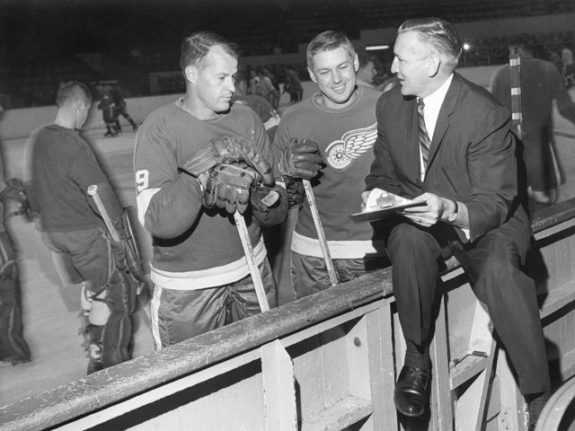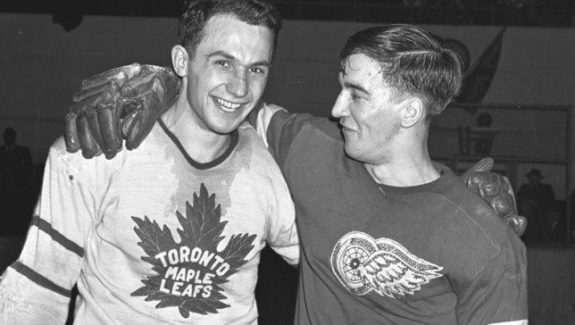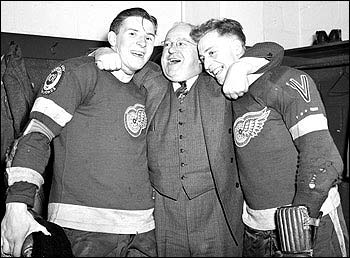Believe it or not, there was a time when the Detroit Red Wings took on the NHL All-Stars – and defeated them.
No, this wasn’t a contest against the rivalry-era Colorado Avalanche or an Edmonton Oilers team from the 1980s. Rather, the Red Wings played against a collection of all-stars from around the NHL.
From 1947 through 1968—with the exception of 1951 and 1952 – the defending Stanley Cup champion competed against the league’s top players in the annual NHL All-Star Game. The Red Wings faced off against the all-stars three times, the last time was in 1955, a 3-1 victory for Detroit.
Red Wings: 1955 NHL All-Star Game
After winning their fourth Stanley Cup in six seasons, the battle-tested Red Wings hosted the NHL All-Star Game the following October. Earl “Dutch” Reibel scored twice and added an assist. Gordie Howe and Ted Lindsay both registered two points and Glenn Hall only allowed one goal in net for the Red Wings.

For what it’s worth, Detroit’s roster could have passed for an all-star team with Howe, Lindsay, Alex Delvecchio, Red Kelly, and Marcel Pronovost all in their prime. Reibel led the team in scoring the season prior while Hall, Norm Ullman, and Johnny Bucyk had just arrived on the NHL scene. And you can’t leave out Marty Pavelich, who was arguably the best shutdown forward of his era.
Detroit’s “All-Stars” took on the NHL’s best, including Jean Beliveau, “Rocket” Richard, and Doug Harvey, plus two former Red Wings goalies: Terry Sawchuk and Harry Lumley. The two had been in net for all four of Detroit’s 1950s Stanley Cups (Lumley in 1950 and Sawchuk in 1952, 1954, and 1955). General manager Jack Adams had traded Sawchuk that summer in a lopsided deal with the Boston Bruins, but the Red Wings were still able to come out on top with the rookie Hall in net.
Related: Worst Trades in Red Wings History
Red Wings: Previous All-Star Games
This wasn’t the first time that the Red Wings defeated an all-star squad. The first victory—a 7-1 demolition of the league’s best in 1950—prompted a change in the All-Star Game format. The NHL iced two all-star teams the following year for a more evenly matched competition. But back to the 1950 slaughter…
Lindsay scored three of Detroit’s seven goals and added an assist. Metro Prystai contributed a goal and two assists. Howe, Pavelich, Kelly, and Jimmy Peters had two points apiece as well. As the newly anointed starter, Sawchuk picked up the victory for the Red Wings.

After the Red Wings handed the all-stars a demoralizing defeat in front of a sparse crowd, the NHL featured two top squads the next two years. It was probably for the best, as the 1952 Red Wings were among the best teams ever to compete in the NHL and they would have destroyed their all-star competition. But by 1953, the league returned to its original format and in 1954, the Red Wings faced off against the league’s top players once again after winning the Stanley Cup the prior spring.
This time, the game was a 2-2 draw. Delvecchio and Howe scored for Detroit, with Reibel assisting on both tallies. Lindsay and Kelly also added assists and Sawchuk stood strong between the pipes for the Red Wings.
Related: Phantom Sniper Fires Up Red Wings’ “Terrible Ted”
Final Word

While the NHL no longer employs this sort of All-Star Game format, Detroit’s record showed just how incredible those 1950s, Jack Adams-led teams were. The Red Wings never lost against the NHL’s best and outscored them 12-4 in three games.
You can make the case that team chemistry played a role in these contests – Detroit’s teams from the 1950s meshed well on and off the ice. Plus, all-star squads rarely have solid chemistry since each player comes from their own system.
It would be interesting to see today’s stacked teams—the Washington Capitals and Tampa Bay Lightning come to mind—take on the league’s best.
The ECHL employs a similar format for their midseason classic. Should the NHL switch their three-on-three format to the defending champions, that season’s first-place team, and the best players from the Eastern and Western Conferences? Imagine the Capitals, Lightning, Western Conference All-Stars, and Eastern Conference All-Stars competing in a three-on-three tournament. That would be quite a sight for hockey fans.